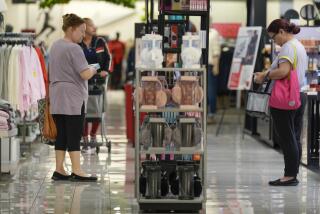Income, Spending Post Fractional Gains
WASHINGTON — Consumer spending remained sluggish in November, inching up just 0.1% after holding steady in the previous month, the government said today. Personal income rose a scant 0.3%, just keeping even with the inflation rate.
The Commerce Department said spending last month totaled a seasonally adjusted annual rate of $3.73 trillion, up from $3.72 trillion in October. The October total was unchanged from the previous month.
At the same time, incomes totaled a seasonally adjusted annual rate of $4.71 trillion, up from $4.70 trillion the previous month when they rose 0.5%. The increase was due entirely to higher farm subsidies. Excluding these payments, personal income was essentially unchanged.
Until October, spending had increased every month since last May. Personal consumption accounts for about two-thirds of the nation’s economic activity.
The department reported earlier this week that consumer spending had risen at a 2.7% annual rate from July through September. But the October and November figures illustrate the weakening in the economy, which most economists now believe is in a recession.
Americans’ saving rate--savings as a percentage of disposable income--edged up to 4% from a 3.7% rate in October. The saving rate for all of 1989 was 4.6%.
The report said Americans’ disposable incomes, or incomes after taxes, inched up 0.3% after remaining flat the previous month.
The spending and income figures were not adjusted for inflation. When adjusted, spending actually fell 0.2% after a 0.8% decline in October, the lowest since a 2.2% decrease in January, 1987.
Disposable incomes, when adjusted for inflation, did not budge from October, when they declined 0.8%, the steepest drop since a 1.1% decline in April, 1989.
A key component of the income category--wages and salaries--fell $3.9 billion, after a revised $15.3-billion decline the previous month. The October drop originally was reported to have been $9.3 billion.
More to Read
Inside the business of entertainment
The Wide Shot brings you news, analysis and insights on everything from streaming wars to production — and what it all means for the future.
You may occasionally receive promotional content from the Los Angeles Times.








